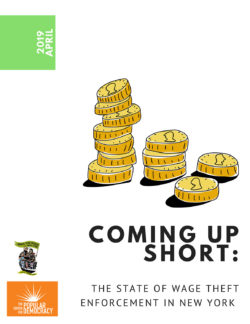Download report HERE.
New York is known for having strong worker protections, including a $15 minimum wage, paid family leave, and protections against wage theft. Yet, despite statutory protections, wage theft persists at epidemic levels. This report illustrates the huge and growing gap between the scale of wage theft in New York and the insufficient level of enforcement by the New York State Department of Labor (DOL), the most visible and accessible resource for workers, particularly low-wage workers. Based on recent data provided by the DOL in response to a Freedom of Information Law (FOIL) request, as well as a review of 95 wage theft cases currently pending before the DOL, we assess the DOL’s current capacity to recover wages stolen from workers, given severe resource constraints.
The Center for Popular Democracy has estimated that wage theft in New York State may impact 2.1 million workers, exceeding $3 billion annually, including non- payment of minimum wages, overtime and more.[1] The Economic Policy Institute has developed a statewide analysis for just one key category of workers facing wage theft – namely, workers receiving less than the legally mandated minimum wage. For this group of workers alone, and not including overtime and other violations, employers annually steal from an estimated 300,000 New Yorkers, resulting in $965 million in unpaid minimum wages, affecting nearly one in five low-wage workers.[2] Other researchers have also agreed that New York’s wage theft crisis disproportionately impacts low-wage workers, immigrants and workers of color.[3] Stolen wages not
only hurt workers and their families–this problem also leads to reduced spending in our communities, makes it harder for responsible employers to compete,[4] and results in lost tax revenue that is necessary for maintaining basic public services and programs.[5]
Combatting wage theft requires a combination of robust public and private intervention. Employers increasingly use forced arbitration clauses to prohibit workers from taking private action in court, effectively closing off one main avenue of enforcement. Although workers subjected to forced arbitration still have the option of filing a claim with local and state enforcement agencies, the DOL – the main forum for workers to pursue claims – is not adequately resourced to effectively hold employers accountable and recover the wages that workers are owed. Increasing limitations on workers’ ability to enforce their rights through private litigation, combined with insufficient resources for public labor standards enforcement, have created a crisis in New York State.
Download report HERE

